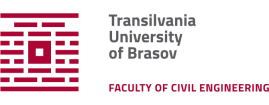About Faculty of Civil Engineering
The higher education in the field of Civil Engineering in Braşov dates back to 1972, when it emerged as a department within the Faculty of Forestry. It first offered evening courses for construction sub-engineers, and in 1976, evening courses for sub-engineers specializing in installations were organized. Following the requests of some construction trusts in Braşov, of some specialized teaching staff and some graduate sub-engineers, full-time courses in engineering starting being offered in the academic year 1991-1992. The specialism Civil, Industrial and Agricultural Constructions was thereby established, to which was subsequently added the specialism of Installations for Civil Engineering, which started to operate in the academic year 1999-2000.
In 2001, the Department of Civil Engineering was established, and in 2002 the Department of Installations for Civil Engineering. The two specializations which formed the nucleus of a new faculty created the premises for the establishment of the current Faculty of Civil Engineering at Transilvania University of Braşov, in June 2003. The specialisms currently operating in the faculty are Civil, Industrial and Agricultural Constructions; Installations for Civil Engineering; Railways, Roads and Bridges.
The main objective of the faculty is to create the appropriate climate for combining and completing the teaching activity with that of theoretical and applied scientific research, thus ensuring the improvement of the quality of the didactic process and the students’ skills acquired upon graduation.
The achievement of the proposed objective entails the following measures:
- • the acquisition by students of competencies so as to ensure their easy integration into the socio-economic environment upon graduation, considering the requirements and criteria imposed by the labour market;
- • the competencies acquired by students upon graduation should be comparable to those acquired by graduate students of the same profile in the country and in the European space;
- • diversification of the continuous training programmes by organizing postgraduate, advanced and specialization courses in accordance with the requirements of the labour market;
- • establishing optimal research programmes;
- • periodic organization of scientific events with national and international participation;
- • establishing and consolidating partnership relations with specialized companies from the economic environment, etc.
These measures have led to the continuous improvement of the didactic and educational process and of the scientific research, in compliance with modern higher education requirements, offering graduation skills and competences meeting the requirements of the labour market in the country and in Europe.



